In 1968, distinguished anthropologist Roy Rappaport wrote a seminal publication of human ecology: “Pigs for the Ancestors: Rituals in the Ecology of a New Guinea People” which integrated cultural ritual with the necessity of maintaining pre-existing relationships with the environment.
Documenting the behavior activities of the Tsembaga Maring tribe in the Highlands of Papua New Guinea, Rappaport recognized how various activities of the tribe’s intrinsic culture was a direct product of that peoples’ relation with their natural environment. The ritual slaughter of pigs, which are tantamount to the pinnacle of wealth and prosperity for many Highlands peoples, was no mere cultural artifact, but done to pay homage to the limits and requirements of population and ecological limitations. Herds of pigs would be reared and fattened until their resource requirements extended beyond carrying capacity and would ultimately lead to land degradation. Upon which the pigs would be slaughtered in a great mumu feast and shared generously amongst members of adjoining family clans. The competition itself between human and pig, much like competition for niche space within an ecosystem, was sufficient enough for the human masters to keep numbers in check and keep energy exchanges constant.
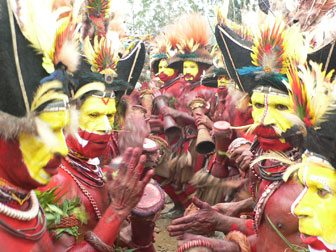 Huli bachelors in a traditional ‘singsing’, performing in Tari town. Their feathers, body paints, clothing, food, shelter and cultural rituals center heavily on the local forests 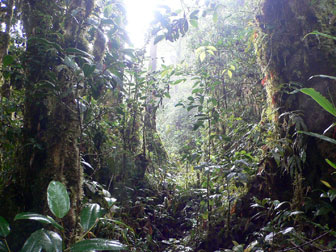 Impenetrable diversity; home to the famed bird of paradise and possibly species yet to be documented. Photos by Vijay Kolinjivadi |
As Rappaport argued, culture and ritual could also be disruptive to ecological systems when it served its own ends (economic or political institutions) rather than those of the society and the ecological limitations from which it was derived from.
More than forty years later, I paid a visit to one such tribe that has similarly co-existed and valued pigs in much the same way. In a community that has seen little outside influence prior to the last two decades, the cultural and environmental impacts are the harbingers of a socio-economic malaise with land stripped of its productive value and indigenous communities left at the whim of a money-based economy with no way to understand, let alone benefit from it. A suitable metaphor might be ‘pulling out the rug from under them’. They can neither go back to adhering to their cultural traditions, nor can they proceed to adopt the new economy and expect to compete in it with the sapped resources left. Meanwhile, some of the world’s most biodiverse and least-studied forests risk great loss at the helm of this unfortunate cultural war.
A $15 billion PNG LNG (Papua New Guinea liquefied Natural Gas) project spearheaded by Exxon-Mobil’s subsidiary Esso Highlands is currently in the preparatory stages to extract natural gas, transport it via pipeline to the capital Port Moresby, liquefy it at a processing plant, and then send it off to foreign markets (mainly China, Japan, and Taiwan). Major extraction is set for 2014 while the next few years will involve developing the necessary infrastructure (roads, airports, processing facilities, electrification) necessary to bring the gas to market. But the changes wrought by this development may be too extreme to bear.
The Huli respond
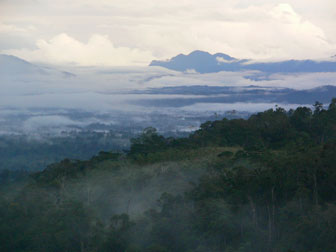 Overlooking the Tari Gap, Southern Highlands, PNG 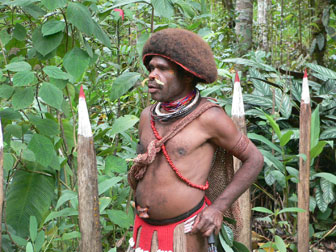 Huli bachelor: ‘hat’ is comprised of human hair grown over many years. Photos by Vijay Kolinjivadi |
The clan groups, rather than individuals or government, owns the land in this area, which is fiercely monitored and adhered to. The Southern Highlands Provincial Government had recently increased requirements for private interests to consult and achieve full consensus with landowners on acquisitions or border disputes. However, since the provincial and national government have given their wholehearted support for the Exxon-LNG project, these promises are not being delivered.
The company is usurping and purchasing land cheaply from Huli clansman. Largely illiterate, the clansmen are being taken advantage of with promises of shares of profit and new land as compensation for construction planned on their land. Officials have not yet delivered independent information to local landowners on the full impacts of the development.
The Huli people reside in a region of the highlands known as the Tari Basin, which today centers on the town of Tari- no more than a carving of an airstrip, ramshackle buildings without power and innumerable thatch houses in otherwise impenetrable rainforest. As with Rappaport’s studied tribe, wealth is measured by the possession of pigs. Only one or two generations of Huli have had contact with western culture and still follow many traditional practices. The people obtain food both by gardening and hunting with more than 50 identifiable products deriving from the rainforest- including tangket leaves (which form the grass skirts that the Huli wear), pandanut, various ferns, mushrooms and medicinal plants, and two species of jungle bamboo for house and weapon construction.
In Huli culture, the chief of the clans reports to a regional chief who monitors and manages conflicts between the clans, arranges daughters to be married, shares the bounties of pig slaughters and harvests, and generally looks after the well-being of the regional group of clans. My friend, the regional chief of the Huli-Malua clan, informed me of the many hours he spent with clan leaders conveying the dangers of taking promises of money for the very land which sustains them. “You may get the money, but what will your children do afterwards? What will you teach them? What will become of us?” While the culture of paying respect to a regional chief still holds, clan chiefs are continuously under pressure to acquiesce their land, making it increasingly difficult for the chief to retain support amidst pressure on all sides.
However, other members of Huli society, who are already invested in a socio-cultural transition of sorts, maintain a different outlook. As the local chief, points out: “Most Hulimen and women are ‘fish in the sky’. They don’t know where they belong. They wear grass wreaths in the hair and western clothes to find a balance between their two selves”.
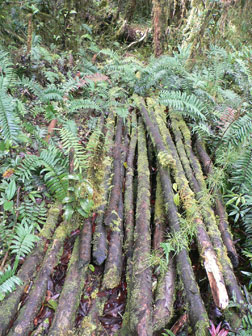 An increasing sight: piles of logged timber in primary forest by local Huli, sold for construction of barracks. Photo by Vijay Kolinjivadi |
Before leaving the region, I managed to stay with a woman working as a community development organizer in Tari. As a Huliwomen, she told me many stories of folklore passed down from her parents, but she openly expressed disdain for some of these past-times, claiming they ‘are no longer important in our society in the nowadays’. She is a single mother, living in a corrugated tin roof trailer located in an isolated police barracks unit of Tari town. She has been living there for more than five years, with no electricity and little in the way of outside communication. She insisted that while problems were rife with the LNG project, the ultimate outcome would be positive and that electricity and other services would be restored to residents who adopted modern lifestyles. “It is the only way forward now”. However, I noticed her and her neighbor experience difficulties in meeting everyday needs in isolation from the forest and the services of food, warmth and shelter it had always provided. Being flung out into a world dependent on modern conveniences, and their associated energy requirements in combination with a distorted monetary system and lack of purchasable goods and services, life was a lot harder in many ways than life amongst the clan. It is ironic that power-generating capacity was actually available for years, given that a photovoltaic cell was installed into each trailer unit…unfortunately, the local police chief had taken control of the generator linked and used it to power his unit 24 hours a day.
Land of Paradise—lost
The rainforests of the Tari Basin and Western areas of the Bismarck Range are home to numerous endemic species- many of which likely remain unknown to science. New Guinea itself is home to 10 percent of the world’s vertebrates, though only 1 percent of the earth’s land mass. While little data exists documenting the species diversity of the basin itself, sustainable ecotourism is an emerging enterprise for the region known for its diversity of birds of paradise and multitude of other birds, found nowhere else on earth. However, my observations in the forest and discussions with local clansman indicate that the forest is being logged at a rapid rate by Huli men themselves, to be sold to an Australian road construction company and for the building of barracks to house migrant workers. The chief explained to me that birds of paradise sightings have plummeted in the last five years, particularly the famed King of Saxony (Pteridophora alberti). Unfortunately no baseline database on population numbers exist for the most prominent species found in the Tari Basin.
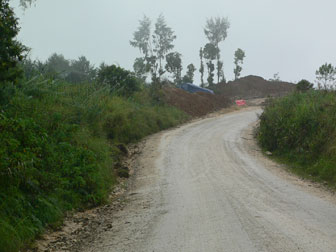 Road development and resulting erosion / water quality problems 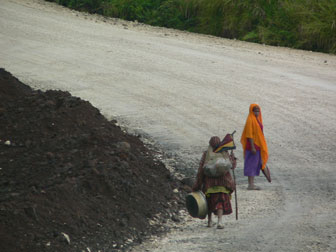 Incongruity of needs and development realities. Photos by Vijay Kolinjivadi |
The destruction of the rainforest in the Tari Gap (approx: 1,400m above sea level) also means changes in local microclimates, impacts on soil erosion at lower altitudes, soil nutrient cycling, loss of endemic and culturally valuable species etc. The building of roads has resulted in lowered water tables and traditional ground water sources that are becoming more difficult to reach by traditional means.
Erosion from large-scale construction and road building is also polluting spring water used by Tari residents and tainting ponds traditionally used to harvest water cress for consumption. Earlier this year, a local child died from chemical poisoning in the vicinity of the liquefied natural gas project. The forest’s health and Huli ways of life are undeniably interconnected. The outcome of this development project on the social fabric of this land could have dire global consequences in the form of untold biodiversity loss and hence the secrets and undetermined ecological services such diversity provides.
Who benefits?
Exxon-Mobil is projecting to make $20 billion in revenue by completion of the first stage of extraction in 2014 from some 200 million barrels of liquefied gas. How much of this will ‘trickle down’ to the residents of the Tari region and other areas of the Southern and Western Highlands remains in question. But what does not remain in question is that the expense of this project on the natural environment and the innumerable and unquantifiable values that the forest provides will surely go unaccounted for.
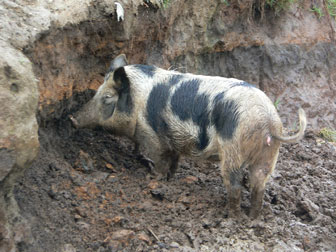 Roaming piglet, of high value to the Huli. Photo by Vijay Kolinjivadi |
In late 2010, 60,000 landowners, already engaged in disputes, protested the LNG project in the Kaiam district. Complaints ranged from land acquisitions without landowner agreement and failures to ensure compensations to landowners and local clans. PNG is endowed with gold, oil and natural gas, yet nearly one-sixth of its population lives on less than $50 a year with little or no access to education, health, markets, household income, transport, or any other kind of economic service.
If my friend, the community development organizer, is right about the positive prospects for the LNG project, nearly all of the revenue would need to be pumped into distributing these services more equitably across the nation. Economic growth in the region can be a good thing, if it does not destroy the resource base and disrupt the diverse social fabric that exists here. But given the rush to grab hold of cash and shutting doors to the many groups not in the select circle of those tasked with distributing the wealth, it calls into question what economic benefit really means.
“Government and the corporations have too much power, and our land is left to suffer”
In response to greater recognition of Huli interests, a Hela Transitional Authority was recognized by the PNG government in 2009 in the formation of a new national province, known as Hela. But recent protests spurred by the ousted Michael Somare government in the Tari region were stepped up beyond the ‘normal’ failure of offering basic services to rural communities: they included a new dimension associated with corrupt officials who lack interest in representing the desperate concerns and worries of Hela landowners amidst land acquisition and usurpation. Indeed, the dissent is so imminent that the situation eerily reminds me of the Bougainville crisis in the 90s, in which failure to account for equitable benefits-sharing and negative environmental impacts of the project generated sufficient protest to shut down one of the world’s largest copper and gold mines operated by Rio Tinto, British-Australian mining giant.
“The government is entirely at fault here. They ought to represent the interests of the people. But they seek to make money quickly and convince the public that what they are doing is correct, but there is no accountability. The government and the corporations have too much power, and our land is left to suffer”, the chief states.
In terms of Rappaport’s human-ecological relationship, over forty years later a new externally-imposed ritual has emerged which sees the pigs neither for their ancestors nor the ancestors for their land.
For more information on the plight of the Huli people and other disenfranchised peoples of the Highlands region, please have a look at the LNG Monitor Blogspot which publishes stories and reveals planned operations of the LNG project on landowners and the local environment.
Related articles
Featured video: new documentary puts human face on logging in Papua New Guinea
(09/27/2011) A new documentary, filmed single-handily by filmmaker David Fedele, covers the impact of industrial logging on a community in Papua New Guinea. Entitled Bikpela Bagarap(or ‘Big Damage’ in English), the film shows with startling intimacy how massive corporations, greedy government, and consumption abroad have conspired to ruin lives in places like Vanimo, Papua New Guinea.
Papua New Guinea suspends controversial grants of community forest lands to foreign corps
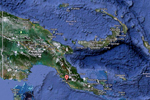
(05/06/2011) The government of Papua New Guinea yesterday suspended its controversial Special Agricultural and Business Leases program which has granted logging and plantation development concessions to mostly foreign corporations across 5.2 million hectares of community forest land, reports the Courier-Post